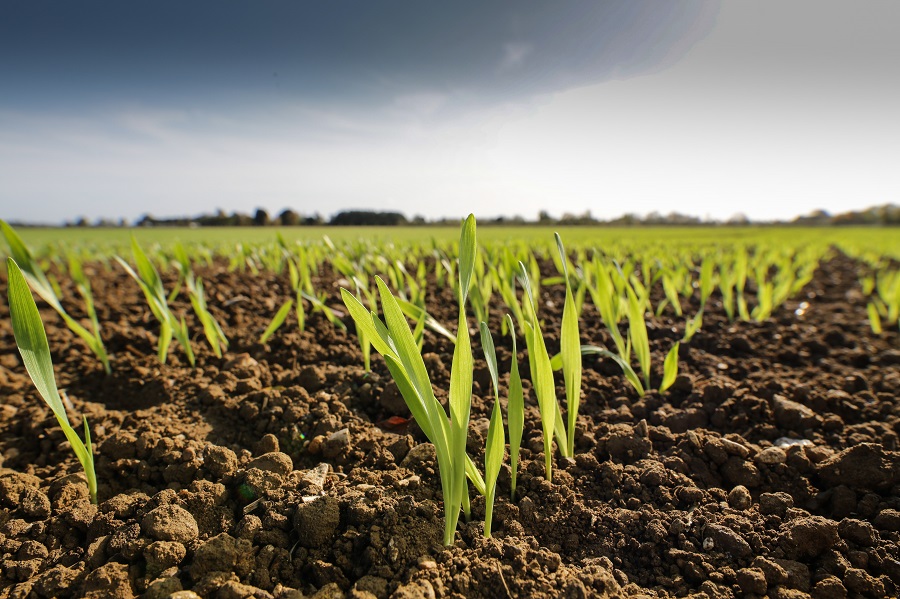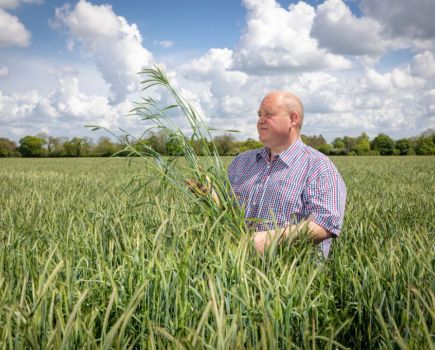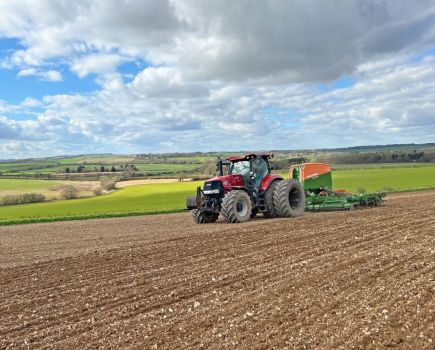The great scientist Sir Isaac Newton is credited with saying ‘Nature is pleased with simplicity’ and that may be holding true for a new seed treatment, derived from plants, that’s able to enhance crop germination and establishment. CPM discovers how it’s doing this.
The signalling peptides in Newton stimulate root and shoot growth.
By Lucy de la Pasture
Advances in the understanding of how plant cells communicate with each other to ‘organise’ the plant’s metabolic responses has led to the development of a new naturally-derived biostimulant seed treatment. Named after one of the most influential scientists in history, Newton could set a new parameter for seed treatments this autumn as it becomes commercially available for the first time, believes Interagro technical manager Stuart Sutherland.
The understanding of signalling in plants has been playing catch up. Interest in the role of small peptides in plant signalling has been overshadowed by research into the influence of non-peptide hormones, such as auxin and cytokinin, even though in mammals the important role of peptide hormones, such as insulin, has been acknowledged for almost a century. Over the past decade that has changed, and the role of peptides in the hormone cascade is acknowledged to be infinitely more complex in plants than in mammals.
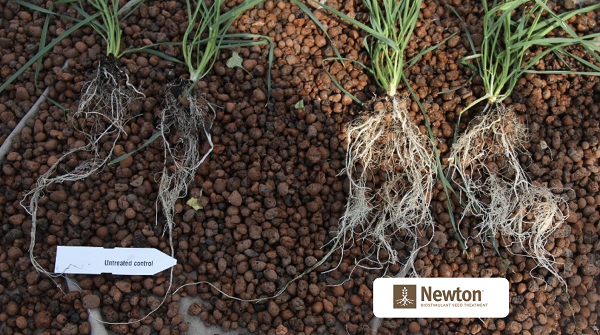
Newton contains post-translationally modified (PTM) signalling polypeptides that play a vital role in regulating crop growth and influencing the behaviour of other plant hormones, explains Stuart. “Formulated with organic nitrogen, Newton is uniquely placed to get crops quickly up and away once planted.
“Establishing a fit and healthy crop depends on getting it quickly out of the blocks, particularly under suboptimal growing conditions that can so often coincide with germination of seed and early establishment of the crop,” he explains.
“With weeds, pests and diseases to contend with, alongside the volatile weather conditions that may be experienced during the early growth phases, getting crops off to the best start is essential to maximise the competitive nature of the crop and protect yield and quality potential.”
So how exactly does Newton help achieve this? The signalling polypeptides it contains stimulate germination of the seed, essentially waking it up, which enhances the rate of seedling emergence. They also influence crop growth, improving root and shoot growth, as well as promoting resilience to abiotic stress.
“All of these factors lead to enhanced vigour, improved crop establishment and better tolerance to stress early on,” he explains.
“Seed germination is a vital step in plant development and a key determinant for plant productivity. Rapid seed germination and uniformity of emergence is important for healthy, vigorous seedlings that grow on to become fit, high yielding crops.”
The exposure of seeds to abiotic stress results in lower seed viability, reduced germination and poor seedling establishment that will lead to poor growth and compromise yield and quality potential later on, explains Stuart.
“The signalling peptides in Newton trigger crop defences which help to promote abiotic stress tolerance.”
But rapid emergence and early seedling growth is heavily reliant on stored energy reserves in the form of carbohydrates and proteins inside the seed, as well as enzymes which trigger seed growth. Low soil temperatures, poor access to moisture, and low energy reserves from poor nutrition in the previous crop, can all delay seedling germination and emergence, leading to poor crop vigour, he adds.
“This is where the organic nitrogen in Newton comes in, providing an energy boost to seed reserves which results in improved seedling vigour.”
After emergence, seedlings must produce the energy they need by acquiring light through the leaves that can be used in photosynthesis, and by absorbing nutrients and water from the soil through the roots.
“Poor shoot growth will slow photosynthesis (and therefore energy production) and a poor root system will prevent access to critical water and nutrients. After germination it’s important that young seedlings don’t dry out – so to prevent this a good root system is essential under dry conditions, where crops will need to access moisture from depth.
“Early access to nutrition and moisture is critical for the healthy and rapid development of the crop. Nutrients have to be accessible to the roots, whilst the healthy development of the leaves will help optimise photosynthesis, as well as provide competition to weeds also likely to be establishing at this time. The signalling peptides in Newton stimulate root and shoot growth, leading to improvements in crop establishment.”
The ingredients within Newton are sourced solely from plants, which makes the new seed treatment natural and it’s fully approved by Organic Farmers and Growers for use on organic crops, he adds.
While the theory behind Newton stacks up, the acid test is how it affects crop performance in the field. In Interagro replicated trials over the past two seasons and in on-farm assessments, the seed treatment has delivered improvements in seedling health and yield increases of 0.28-0.6 t/ha in farmer trials, claims Stuart.
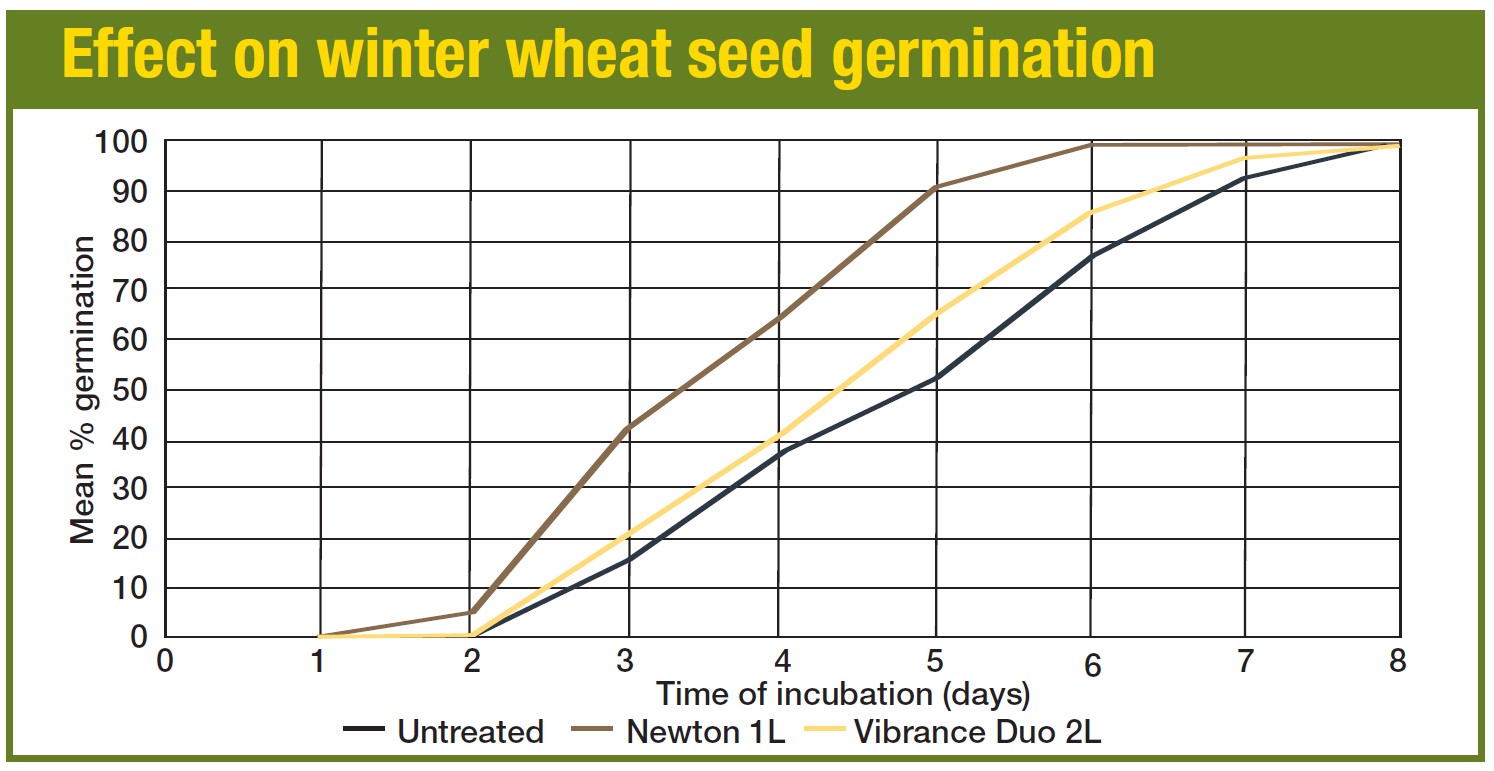
Under controlled conditions at 7°C using winter wheat cv. KWS Siskin –– 10 replicates
Source: University of Nottingham, 2019.
Newton’s performance has also been tested under controlled conditions at the University of Nottingham, where research by Dr Steve Rossall has shown significant germination and establishment benefits from treating both wheat and barley seed.
“In these challenging times, global food security is becoming increasingly important, so it’s vital that crop yields are consistent and improved, even when climatic conditions are not ideal,” says Steve. “Good early crop establishment is essential to ensure crop productivity can be maximised, and to this end, a range of materials known as plant biostimulants are now available to farmers and growers.
“These include foliar-applied materials such as Bridgeway, which have been available for a number of years. To be successful, biostimulants must provide a cost-effective benefit to users and be easily integrated into existing farm practices. To support the latter, Interagro have now developed a seed-applied biostimulant treatment.
A series of laboratory petri dish and glasshouse pot experiments were conducted at the University of Nottingham on behalf of Interagro, explains Steve. The tests investigated the effect of Newton on early plant growth in winter wheat and spring barley.
“When the rate of seed germination in winter wheat was tested at 7oC (a soil temperature which late-sown wheat may be exposed to), the time taken to achieve 90% seed germination was improved by two days with Newton-treated seed. At 10oC Newton improved germination by one day over naked (untreated) seed. At both temperatures Newton increased the rate of germination over Vibrance Duo (fludioxonil+ sedaxane) by 1.5 days and 0.75 days respectively,” he reports.
“In the glasshouse, plant growth over the first four weeks after emergence was evaluated. Significant enhancement of root growth was observed, with a smaller increase in shoot growth. In wheat and barley, increases in root biomass were commonly in excess of 30% after seed treatment with Newton.
“Moreover, a combination of seed treatment followed by a foliar application of Bridgeway gave a root growth enhancement in excess of 50%,” says Steve.
All in all, Steve believes the benefits from treating seed with Newton were superior to those observed after treatment with Vibrance Duo. “Although this is used primarily as a fungicide, claims have been made that Vibrance Duo can also enhance root growth.
“While glasshouse pot experiments provide proof of concept, plants are grown under ideal conditions, so they only provide an indication of field performance, but Interagro’s own field trials have supported these conclusions.
“I believe the beneficial effects of Newton are real and can provide a significant improvement in crop establishment, leading to enhanced and more consistent yields. Newton is an excellent seed treatment addition to the range of plant biostimulants available to farmers,” concludes Steve.
What are signalling peptides?
Plant hormones auxins, gibberellins, cytokinins, abscisic acid and ethylene have long been known as the mainstay plant signalling molecules. There are other hormones such as jasmonates, brassinolides and salicylic acid.
In 1991, Pearce et al discovered an 18-amino acid peptide, called systemin, in a tomato plant that was identified as having signalling properties. Since then secreted peptides have been distinguished into different groups – cysteine-rich peptides (CRPs) typically contain 40–100 amino acids and post-translationally modified small peptides (PTMs), which contain less than 40 amino acids (usually 10-20).
Secreted peptide signalling molecules are involved in intercellular and intracellular communication in plants and help in growth, development, defence, and homeostasis (maintaining balance). Once in the plant, the peptides bind with receptors to introduce a phosphate into the group which triggers intracellular signalling, which in turn activates the cell response.
The application of these signalling peptide phytohormones influence the behaviour of other hormones, to the overall benefit of the plant. They mediate the balance of the growth-promoting hormones (auxins, gibberellins and cytokinins) versus the growth-inhibiting hormones (ethylene and abscisic acid), which leads to improved root formation (especially root hairs), improved gravitropic response, vascular development, abiotic stress responses and environmental symbiosis.
Newton recommendations
- Use at 1.0 l/t of seed
- For use in winter and spring cereals
- Approved by Organic Farmers and Growers for use on organic crops
A proactive approach to managing stress
Keith Challen makes no secret that biostimulants are now an integral part of his crop management at Belvoir Fruit Farms in Lincolnshire. He’s seen the value of Bridgeway and Zonda on the farm’s heavy clay soils for a number of years, so it made sense to him to trial Interagro’s new seed treatment, Newton, when given the opportunity.
Keith describes the farm as ‘stressy’, not just for him but for the crops are well, he says wryly. “In some years everything is good but it’s often too wet, too cold or too dry compared with other farms I’ve managed over the past 30 years.”
It’s the third year the farm has had access to Newton so already Keith is building up experience under different growing conditions.
“Last year the Newton-treated seed came through the ground quicker than the control. This year we’ve used it on spring barley seed, and this hasn’t been the case. But even though emergence hasn’t been quicker, on inspection the treated plants have developed an estimated 30% bigger root mass which will mean roots can forage moisture better. This will be a huge benefit under the dry conditions we’re experiencing,” he says.
“In my view, farming is all about managing risk and that’s difficult at planting when you have no idea what sort of season is in front of you, especially as weather patterns seem to be getting stuck in extremes on a more regular basis.
“Applying a seed treatment that can help the plant deal with future stress is a proactive approach to coping with these extremes. Newton is a natural product that’s able to support a diminishing pool of chemistry and it’s reassuring that it’s been scrutinised for use in an organic situation.”
Keith plans to treat all his seed with Newton this autumn having seen yield responses of 0.4-0.6 t/ha in his farm trials. He also intends to compare the performance of seed treated with Newton to seed with both the biostimulant treatment and a single purpose dressing applied.
“The year that we don’t get a yield benefit on this farm will be when weather conditions are perfect, and then that won’t really matter,” he concludes.
Pushing performance
At the heart of good crop production lies careful use of chemistry to protect the plant and maintain performance, right through the season. But optimising the efficacy of plant protection products can be challenging, while increasingly restrictive regulations limit just how far you can go.
This series of articles explores the science behind the use of adjuvant and biostimulant tools to help power both chemistry and crop performance, as well as increase understanding of why they’re needed and what they do. We’re setting out to empower growers and drive crops to reach their full potential.
CPM would like to thank Interagro for kindly sponsoring this article, and for providing privileged access to staff and material used to help put the article together.
Containing a novel and unique blend of crucial signalling peptides and organic nitrogen, Newton is a new phytohormone biostimulant seed treatment, developed to get cereal crops off to the best possible start to maximise seed potential. Newton helps awaken dormant seed, prompts growth and development, and triggers stress defence mechanisms to help young seedlings acclimatise to changes in environmental conditions. For the best start, and better finish, choose Newton.
For more information on Newton and how to purchase, please contact Interagro: www.interagro.co.uk/newton

